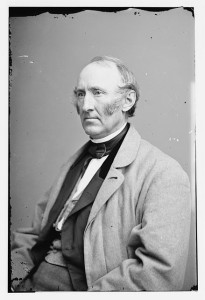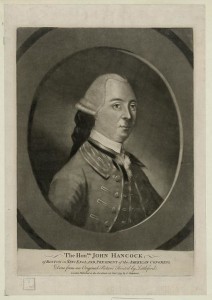150 years ago yesterday abolitionist Wendell Phillips spoke in New York City about his views on the Union after the North presumably won the shooting war. He seemed to imply that reconstruction would be complete when the South was an “exact counterpart of New-England.” Mr. Phillips was concerned with hundreds of thousands returning home with nothing to do but politics and with the immense debt the nation was accumulating. His speech was reported in a very long paragraph. Here are some excerpts along with an order by John Adams Dix detailing what was to be done with Union army deserters caught in New York State.
From The New-York Times February 17, 1864:
WENDELL PHILLIPS ON RECONSTRUCTION.; Fifth Lecture in the Course of the Women’s Loyal League. Department of the East.
WENDELL PHILLIPS last evening gave, in a lecture delivered under the auspices of the Women’s Loyal National League, hi[s] views of the means by which reconstruction of the Union was to be effected. The announcement of the speaker and the subject attracted a large audience, who gave the speaker the closest attention. The speaker was introduced by OLIVER JOHNSON, Esq.
Mr. PHILLIPS, in rising, was greeted with loud demonstrations of applause. The subject upon which he was to speak was reconstruction — the way out of the war. Any criticisms he might make were not from any desponding view on his part, of the present hour; the North would triumph, her civilization supersede that of the South. He did not believe that the purpose of heaven above, or the Copperhead of the earth beneath, or the Secessionist of Richmond under the earth, would prevent it. [Applause.] He believed that the nation would be a free one. The negro, like every other race under the Stars and Stripes, would have his manhood accorded him. The rebellion had killed Slavery, but killed it as a typhus fever kills a man who rises at length from his bed and drags a weary life of pair for a half dozen years and then dies. When it would die no one knew; that depended upon the statesmanship of the future upon the method of reconstruction. They might think he said too much of the negro, but that race and our treatment of it was the pivot upon which the white man’s interest, the national unity and the prosperity of the Union turned. … At present, in the South, labor was dishonorable. This state of affairs must be changed, and it would be a long and tedious process to change the sentiments of the Southern people on that point. He had known a Southern man to lose his passage on a railroad train, waiting for a negro to put his valise on the freight car. The ablest, man of the West, ANDY JOHNSON, [applause,] was willing the negroes should fight, but he was going to make this exclusively a white man’s Government. There would never be a set of men in Tennessee, fit to sit down and legislate on the interests of the Empire State, till ANDY JOHNSON could see JOHN HANCOCK under a black skin. [Applause.] By keeping the masses ignorant, the Southern leaders had carried their States out of the Union. By infusing knowledge into those men those States could be made to gravitate back to the Union, and they would inevitably do it. … His reconstruction is the plan that is to be typified by those two men side by side [SC Gov.Aiken and Robert Small], with the ability to produce a future that shall be the exact counterpart of New-England and when that is done, the epoch is ended. We, have difficulties enough ahead of us. We are not again to see the nation in which we were born. The old-fashioned calm, quiet, home-bred, school-house farming Republic is gone forever. A Connecticut full of BARNUMScannot find the Union as it was. When this epoch ends — no matter when — we are to find a nation developing constantly into a first-rate military power. A million of disbanded soldiers, half fit for war, half unfit for anything else, will be scattered among us. They are to bring back to civil life ten thousand officers, their idols. They will find business and the professions moderately crowded. They will find hardly a place except in politics. … That same military bias and spirit has been the grave of free government in all time. On the other side we are to have that other great danger to free government, an immense debt. We believed we shall pay our debt and the Southern debt besides. … He did not distrust the President. [Great applause.] He was all God made him. He had grown wonderfully in three years. At first he would not teach the negro. Finally he rose up and said, in the Summer of 1862, “the negro is either a man or money; if he is a man, I will enlist him; if he is money, I will spend him.” [Laughter.] … Mr. PHILLIPS closed as follows: What we want in the future is to know where we are going. We have a right to know it. We have made a red path of the dearest and best blood of the country from New-England to New-Orleans. We have given Virginia a better title than the Mother of Presidents — we have given her the name, the Grave of Martyrs. Such sacrifices are not to be compensated for by half results. By every mother that listens and never hears the voice she loved best, by every empty seat by the hearth-stone, by every danger in the future, I claim of you not only for the negroes’ sake, but for twenty millions of white men whose prosperity is in the balance, that you be not wanting in vigilance, sincerity, daring in this hour of the nation’s crisis; that you demand of every man to explain his record, and welcome criticism, if he asks to lead the country; that he show himself capable of doing it, and show us his plan.
Mr. PHILLIPS retired amid applause.
The following order was promulgated yesterday:
HEADQUARTERS DEPARTMENT OF THE EAST, NEW-YORK CITY, Feb. 16, 1864.
SPECIAL ORDERS No. 38. — *** III, All deserters arrested by Provost-Marshals and their deputies in the State of New-York will be delivered to the Provost-Marshal of the Southern District, at the Barracks, corner of Broome and Elm streets, New-York City, except those belonging to posts in and, around New-York City and harbor, and those belonging to other commands now in this department, who will be forwarded as heretofore to, their respective posts without delay. Three copies of descriptive rolls will be sent in all cases. ***
By command of Maj. Gen. DIX,
D.T. VAN BURER, COL. and Assists Adjt.-Gen.


